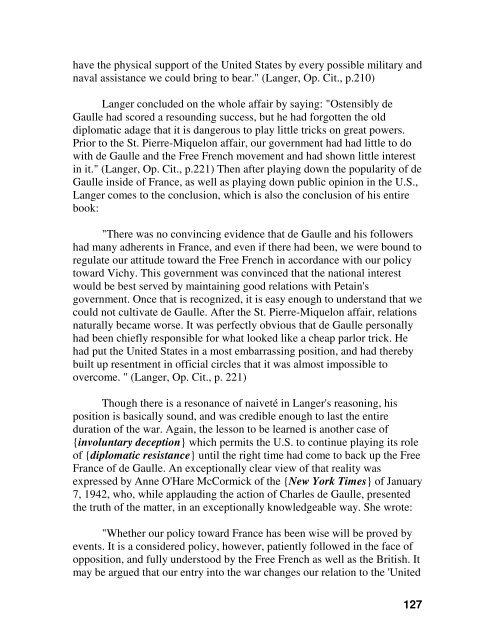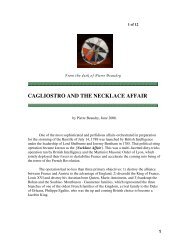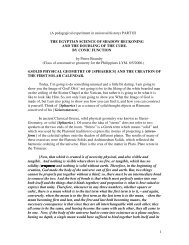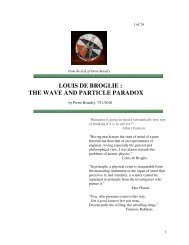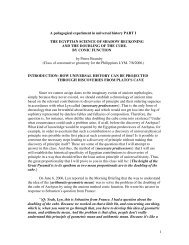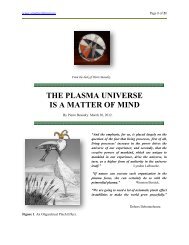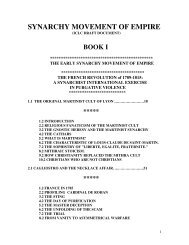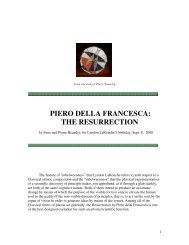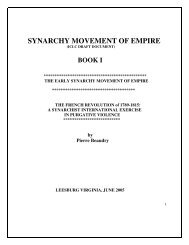synarchy movement of empire book ii - Pierre Beaudry's Galactic ...
synarchy movement of empire book ii - Pierre Beaudry's Galactic ...
synarchy movement of empire book ii - Pierre Beaudry's Galactic ...
You also want an ePaper? Increase the reach of your titles
YUMPU automatically turns print PDFs into web optimized ePapers that Google loves.
have the physical support <strong>of</strong> the United States by every possible military and<br />
naval assistance we could bring to bear." (Langer, Op. Cit., p.210)<br />
Langer concluded on the whole affair by saying: "Ostensibly de<br />
Gaulle had scored a resounding success, but he had forgotten the old<br />
diplomatic adage that it is dangerous to play little tricks on great powers.<br />
Prior to the St. <strong>Pierre</strong>-Miquelon affair, our government had had little to do<br />
with de Gaulle and the Free French <strong>movement</strong> and had shown little interest<br />
in it." (Langer, Op. Cit., p.221) Then after playing down the popularity <strong>of</strong> de<br />
Gaulle inside <strong>of</strong> France, as well as playing down public opinion in the U.S.,<br />
Langer comes to the conclusion, which is also the conclusion <strong>of</strong> his entire<br />
<strong>book</strong>:<br />
"There was no convincing evidence that de Gaulle and his followers<br />
had many adherents in France, and even if there had been, we were bound to<br />
regulate our attitude toward the Free French in accordance with our policy<br />
toward Vichy. This government was convinced that the national interest<br />
would be best served by maintaining good relations with Petain's<br />
government. Once that is recognized, it is easy enough to understand that we<br />
could not cultivate de Gaulle. After the St. <strong>Pierre</strong>-Miquelon affair, relations<br />
naturally became worse. It was perfectly obvious that de Gaulle personally<br />
had been chiefly responsible for what looked like a cheap parlor trick. He<br />
had put the United States in a most embarrassing position, and had thereby<br />
built up resentment in <strong>of</strong>ficial circles that it was almost impossible to<br />
overcome. " (Langer, Op. Cit., p. 221)<br />
Though there is a resonance <strong>of</strong> naiveté in Langer's reasoning, his<br />
position is basically sound, and was credible enough to last the entire<br />
duration <strong>of</strong> the war. Again, the lesson to be learned is another case <strong>of</strong><br />
{involuntary deception} which permits the U.S. to continue playing its role<br />
<strong>of</strong> {diplomatic resistance} until the right time had come to back up the Free<br />
France <strong>of</strong> de Gaulle. An exceptionally clear view <strong>of</strong> that reality was<br />
expressed by Anne O'Hare McCormick <strong>of</strong> the {New York Times} <strong>of</strong> January<br />
7, 1942, who, while applauding the action <strong>of</strong> Charles de Gaulle, presented<br />
the truth <strong>of</strong> the matter, in an exceptionally knowledgeable way. She wrote:<br />
"Whether our policy toward France has been wise will be proved by<br />
events. It is a considered policy, however, patiently followed in the face <strong>of</strong><br />
opposition, and fully understood by the Free French as well as the British. It<br />
may be argued that our entry into the war changes our relation to the 'United<br />
127


